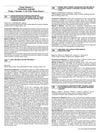Urethral PSA Levels After Radical Prostatectomy
September 2010
in “
European Urology Supplements
”

TLDR Higher urethral PSA levels after prostate removal surgery may be linked to more hair loss and higher PSA levels post-surgery.
The document presents findings from several studies related to prostate cancer, with a focus on factors such as opioid consumption, serum PSA levels, and the relationship between serum triglyceride concentration and prostate cancer risk. One study involving 29 opium users and 39 non-users found a significant association between opium consumption and lower serum PSA levels, suggesting a potential role for opioids in prostate cancer control. Another study with 358 men undergoing prostate biopsies reported a positive predictive value of 51.4% for total serum PSA in detecting prostate cancer, with a significant association between PSA density and cancer diagnosis. A third study with 194 cases and 317 controls found no significant association between serum triglyceride levels and prostate cancer risk. Lastly, a study of 45 patients who underwent radical prostatectomy showed that higher urethral PSA levels were associated with higher androgenic alopecia scores and higher postoperative PSA, indicating a possible link to local dihydrotestosterone activity. The document also touches on the incidence and treatment of prostate cancer in Kosovo, with a particular focus on radical prostatectomy for locally advanced prostate cancer.






